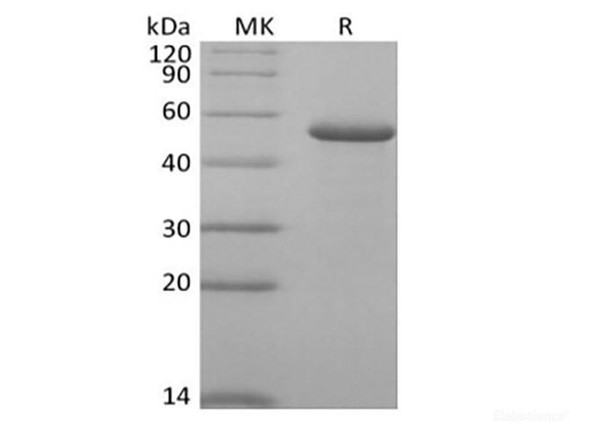| Sequence: | Gln26-Lys482 |
| Accession: | P08575-8 |
| Storage: | Generally, lyophilized proteins are stable for up to 12 months when stored at -20 to -80°C. Reconstituted protein solution can be stored at 4-8°C for 2-7 days. Aliquots of reconstituted samples are stable at < -20°C for 3 months. |
| Shipping: | This product is provided as lyophilized powder which is shipped with ice packs. |
| Formulation: | Lyophilized from a 0.2 μm filtered solution of PBS, pH 7.4. Normally 5 % - 8 % trehalose, mannitol and 0.01% Tween80 are added as protectants before lyophilization. Please refer to the specific buffer information in the printed manual. |
| Reconstitution: | Please refer to the printed manual for detailed information. |
| Background: | Protein tyrosine phosphatase, receptor type C (CD45), also known as PTPRC is a member of the protein tyrosine phosphatase (PTP) family which is known for its function to serve as signaling molecules and to regulate a variety of cellular processes such as cell proliferation, differentiation, mitotic cycle and oncogenic transformation. It is a variably glycosylated 180-220 kDa transmembrane protein that is abundantly expressed on all nucleated cells of hematopoietic origin. CD45 has several isoforms, expressed according to cell type, developmental stage and antigenic exposure. CD45 has been best studied in T cells, where it determines T cell receptor signaling thresholds. CD45 is moved into or out of the immunological synapse (IS) membrane microdomain depending on the relative influence of interaction with the extracellular galectin lattice or the intracellular actin cytoskeleton. Galectin interaction can be fine-tuned by varying usage of the heavily O-glycosylated spliced regions and sialylation of N-linked carbohydrates. Within the IS, CD45 dephosphorylates and negatively regulates the src family kinase, LCK. In other leukocytes, CD45 influences differentiation and links immunoreceptor signaling with cytokine secretion and cell survival, partially overlapping in function with DEP-1/CD148. CD45 deletion causes in severe immunodeficiency, while point mutations may be associated with autoimmune disorders. |






